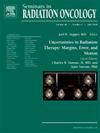Personalising Nasopharyngeal Cancer: Systemic Therapy and Radiotherapy Treatment Volumes
IF 3.2
3区 医学
Q3 ONCOLOGY
引用次数: 0
Abstract
Nasopharyngeal carcinoma (NPC) is sensitive to chemotherapy and radiotherapy, with current treatment recommendations largely based on TNM-stage. Radiotherapy remains the backbone of treatment for NPC. Over the past decades, the addition of concurrent chemotherapy to radiotherapy for early-stage disease, and the combination of induction chemotherapy (IC) or adjuvant chemotherapy (AC) with chemoradiotherapy vs chemoradiotherapy alone for advanced disease have led to substantial improvements in survival of patients with NPC. Nonetheless, in the era of precision oncology, there is growing recognition that patients with NPC are clinically heterogeneous even within the same stage-group, and future advances must focus on individualisation of systemic therapy and radiotherapy. In this review, we summarised the published evidence on EBV DNA as a biomarker for clinical stratification and treatment response in NPC, and discussed some of the ongoing clinical trials of EBV DNA-directed personalisation of systemic therapy in locoregionally-advanced disease. Next, we assessed the evidence concerning individualised radiotherapy strategies for target volume delineation of the primary tumour and cervical nodes that ought to be based on individual tumour extent and IC response (for locoregionally-advanced NPC) as opposed to the historical one-size fits all approach. In the same vein, radiotherapy dose de-escalation may be considered in good responders to IC, whereas for the poor responders, altered fractionation or dose escalation may be required to target resistant disease. These concepts are particularly relevant in the era of combinatorial immune checkpoint blockade therapy with radiotherapy, where preservation of circulating immune cells is crucial to evoke immune-mediated antitumour cytotoxicity.
个体化鼻咽癌:全身治疗和放射治疗卷
鼻咽癌(NPC)对化疗和放疗敏感,目前的治疗建议主要基于tnm分期。放疗仍然是鼻咽癌治疗的主要方法。在过去的几十年里,早期疾病在放疗的基础上增加了同步化疗,晚期疾病的诱导化疗(IC)或辅助化疗(AC)联合放化疗与单独放化疗相结合,使得鼻咽癌患者的生存得到了实质性的改善。然而,在精准肿瘤学时代,人们越来越认识到,即使在同一分期组中,鼻咽癌患者的临床异质性,未来的进展必须集中在全身治疗和放疗的个体化上。在这篇综述中,我们总结了EBV DNA作为鼻咽癌临床分层和治疗反应的生物标志物的已发表证据,并讨论了一些正在进行的针对局部区域晚期疾病的EBV DNA定向全身治疗的临床试验。接下来,我们评估了关于原发性肿瘤和宫颈结靶体积描绘的个体化放疗策略的证据,这些放疗策略应该基于个体肿瘤范围和IC反应(对于局部区域晚期鼻咽癌),而不是历史上的一刀切方法。同样,对于对IC有良好反应的患者,可以考虑放疗剂量递减,而对于反应较差的患者,可能需要改变分割或剂量递增以靶向耐药疾病。这些概念与放射疗法联合免疫检查点阻断疗法的时代特别相关,其中保存循环免疫细胞对于激发免疫介导的抗肿瘤细胞毒性至关重要。
本文章由计算机程序翻译,如有差异,请以英文原文为准。
求助全文
约1分钟内获得全文
求助全文
来源期刊
CiteScore
5.80
自引率
0.00%
发文量
48
审稿时长
>12 weeks
期刊介绍:
Each issue of Seminars in Radiation Oncology is compiled by a guest editor to address a specific topic in the specialty, presenting definitive information on areas of rapid change and development. A significant number of articles report new scientific information. Topics covered include tumor biology, diagnosis, medical and surgical management of the patient, and new technologies.

 求助内容:
求助内容: 应助结果提醒方式:
应助结果提醒方式:


